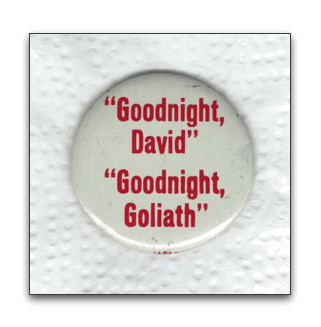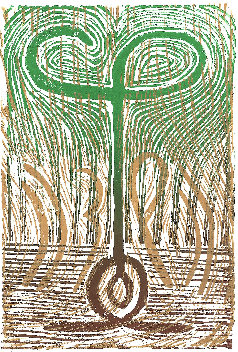Is Fake News vs. Truth a case of Goliath vs. David?
Once we knew one truth
Over forty years ago, Rabbi Richard N. Levy wrote a paragraph that entered the Gates of Prayer Siddur. I quoted from it in a sermon during the Clinton impeachment hearings that dealt with “what is truth”.
Once we learned one truth, and it was cherished or discarded, but it was one. Now we are told that the world can be perceived by many truths; now, in the reality all of us encounter, some find lessons that others deny. Once we learned one kind of life, and one reality; it too we either adopted or scorned. But right was always right and wrong was always wrong. Now we are told that there are many rights, that what is wrong may well be wrong for you but right for me.
I have been thinking about this text along with a number of others that have been part of my personal anthology as our awareness of fake news stories has grown.
We live in a world remarkably different from the one that existed through most of the twentieth century. We are still reeling from Albert Einstein’s discoveries of a century ago. They marked a turning point in how we have understood our world ever since. Einstein truly convinced us that everything is relative on the physical plane, and from that we’ve generalized to the ethical and moral plane in our “post modern” world. Now we talk about “situational ethics,” and are puzzled when “we are told that what is wrong may well be wrong for you but right for me.”
Among the earliest songs I learned was:
I’m Proud To Be Me, by Hy Zaret (which is included in the Songs for [Girl] Scouts Web page)
I’m proud to be me but I also see;
you’re just as proud to be you.We might look at things a bit differently,
but lots of good people do.It’s just human nature,
so why should I hate you for being as human as I.We’ll get as we give, and we live and let live
and we’ll all get along, If we try.I’m proud to be me but I also see,
you’re just as proud to be you.It’s true, you’re just as proud to be you!
Click the link to listen: I’m Proud To Be Me The song will open in a new page.
I also grew up with the story of the Churkendoose. The story was intended to teach tolerance of various people. A strange egg was found in the hen house. No one knew whose egg it was so they each took turns sitting on it. Eventually, the egg cracked and out stepped the strangest creature they’d ever seen: part chicken, turkey, duck, and goose: they called it the Churkendoose. When everyone was shocked to see what a strange being it was, the Churkendoose broke into song:
It depends on how you look at things,
It depends on how you look at things,
Is the baby chimpanzee any prettier than me
It all depends upon, begins and ends upon,
It all depends on how you look at things.
Of course, the concept of being aware of different facts based on our perception long predates mid-twentieth century children’s literature. Even before Einstein’s relativity John Godfrey Saxe introduced the Western world to the concept of multiple possible truths when he appropriated Indian sub-continent traditions to write his poem “The Blind Men and the Elephant”:
It was six men of Indostan
To learning much inclined,
Who went to see the Elephant
(Thought all of them were blind).
That each by observation
Might satisfy his mind
maybe, gray, warm, or…
Even though so much of our world is shaped by computers that function by combining only ones and zeros, we know that we should not be constricted by false binaries. The world is not only
- One/Zero
- Yes/No
- On/Off
- Black/White
- Hot/Cold
- True/False
When you mix enough ones and zeros together, you can create a near-infinite number of shades of gray and other colors. As my sister has taught me to think, we don’t need to say: “yes, but” instead, we can say: “yes, and”. The former closes off possibilities, while the latter opens us to more.
So, does that mean that there is no such thing as fake news? Is anything anyone says equally valid? No. Some things are facts and others are not. Certain statements are true and others are false. You cannot choose whether or not something is a fact. Facts simply exist.
In my opinion, that’s a fact.
Our father used to say, quoting one of his clients in jest: “In my opinion, that’s a fact.” However, opinions and facts are of two different categories. As Daniel Patrick Moynihan said: “You are entitled to your opinion. But you are not entitled to your own facts.” Amazingly enough approximately ten years after our father died, Lanny J. Davis used the exact phrase our father quoted, but in all seriousness. In the chapter “The View From The White House” in the book The Clinton Presidency and the Constitutional System, he wrote:
There was no legitimate basis to impeach President Clinton on perjury. In my opinion, that’s a fact.
Oddly enough the phrase turns up every now and then, as though people have difficulty distinguishing between facts and opinions.
But there’s a difference between developing various opinions based on perceiving contrasting facts about an elephant and believing that elephants can fly based on a fiction or an image that someone has created.

Our drift from acknowledging fact to believing fiction has happened over at least the past 16 years. Stephen Colbert was among the first to make note of the substitution of opinion for fact to a mass audience when he coined the word “Truthiness”.
“Yes, well,” he huffed. “You can prove anything with facts, can’t you?”
Actually the situation goes deeper and further back than the beginning of this millennium, at least as early as 1992. The issue is not simply Truthiness, but “post-truth”. It appears as though a significant portion of our fellow citizens are willing to live in a world in which facts are not real. While Americans have joked about Truthiness, among the Russian political elite, a different idea has grown. The concept of “post-truth politics”.
The British newspaper The Guardian described the phenomenon in March of 2015 (recognizing this as a problem even before Trump announced his candidacy on June 16, 2015): The Guardian view on Russian propaganda: the truth is out there
It is a tactic straight out of Mr Putin’s KGB playbook from the 1970s. Generate a plurality of narratives, so the truth can be obscured. In such circumstances, the very idea that there is such a thing as “the truth” can itself be called into question. “There is no objectivity – only approximations of the truth by as many different voices as possible” is how Margarita Simonyan, the editor-in-chief of state-backed Russia Today, puts it. This is weaponised relativism [emphasis mine, MH].
One of the foremost ringmasters of this postmodern authoritarianism is Putin adviser and trendy former TV executive Vladislav Surkov; he is as comfortable talking about performance art and rap music as he is about contemporary politics. For him, all news is comment, all truth little more than opinion. There is the BBC view. The Fox News view. The Russia Today view. All are expressions of special interests, not so much attempts at the truth as individual perspectives and localised narratives.
Mr Surkov grasps that all this chimes closely with the idea, familiar in the west, that any and every perspective can be legitimised as a matter of individual opinion. On the basis of this lazy philosophy, the idea that one view is right and another wrong can be made to sound like some unwarranted imposition of authority. You can already hear the objection to the assertion of truth: “Who is to say who is right?”
Flying seemingly under the radar, even The New York Times wrote about the process before @realDonaldTrump perfected its use in American politics. In an OpEd column published in December of 2014, Peter Pomerantsevdec wrote Russia’s Ideology: There Is No Truth:
The Kremlin’s goal is to control all narratives, so that politics becomes one great scripted reality show. [emphasis mine; sound familiar? MH] The way it wields power illustrates and reinforces this psychology. Take Vladislav Y. Surkov, an adviser to President Vladimir V. Putin who is said to manage, among other things, the public image of the Russian-speaking separatist leaders in eastern Ukraine. He helped invent a new strain of authoritarianism based not on crushing opposition from above, but on climbing into different interest groups and manipulating them from the inside. On his desk in the Kremlin, Mr. Surkov had phones bearing the names of leaders of supposedly independent parties. Nationalist leaders like Vladimir V. Zhirinovsky would play the right-wing buffoon to make Mr. Putin look moderate by contrast.
With one hand Mr. Surkov supported human rights groups made up of former dissidents; with the other he organized pro-Kremlin youth groups like Nashi, which accused human rights leaders of being tools of the West. In a novel presumed to be written by Mr. Surkov, who is also an art-loving bohemian when not waging covert wars, he celebrates the triumphant cynicism of a post-Soviet generation that has seen through the illusions of belief in any values or ideology.
Create Two, Three, Many Fires
Donald Trump seems to have learned a lesson from both Vladislav Surkov and Che Guevara. Instead of many Vietnams that Guevara called for in October 1967, Trump starts two, three, many fires that keep all of us off guard. In the words of one of his surrogates Scottie Nell Hughes on November 30 at 10:28 AM: “Everybody has a way of interpreting them [facts] to be the truth, or not truth. There’s no such thing, unfortunately, anymore as facts.” As The New Yorker summarized at the end of November:
It nonetheless warrants remembering that there is nothing normal about what we are witnessing. In the past two weeks, the President-elect has settled a fraud lawsuit over Trump University and assailed the cast of “Hamilton” on Twitter, while the neo-Nazi National Policy Institute held a gathering in Washington, D.C., at which some of its attendees offered the Nazi salute in praise of Trump. The U.S. Holocaust Memorial Museum has issued a statement reminding Americans that the Holocaust “did not begin with killing; it began with words.” Two years ago, any one of these events would have been seen as extraordinary. In the current crush of the absurd, they come dangerously close to blending into the background in the way that police sirens can become ambient noise in New York City.
Many of the fires Trump starts are nuisances in garbage cans. With enough of them burning, they have the ability to distract us from larger potential conflagrations smoldering nearby. And, as hard as it is for many of us to accept, huge swaths of the American public accept the lies that the President-Elect tells.
I’ll have some Flynn Jr. on mine
It feels almost as though Trump decided to make Michael J. Flynn, Jr. a scapegoat because of “Pizzagate” to take donwn one fake news story so that many others could continue to spread.
- The Comet Ping Pong “Pizzagate” gunman shows why fake news is more dangerous than ever
- Trump Fires Adviser’s Son From Transition for Spreading Fake News
- Why people believe conspiracy theories like ‘pizza gate’
Yet, why do some (so many) people continue to believe falsehoods, despite the existence of contravening facts that I, and so many of the people I know, accept as fact? According to an article in Alternet: An Insider’s View: The Dark Rigidity of Fundamentalist Rural America; In deep-red white America, the white Christian God is king.
Education is the enemy of fundamentalism because fundamentalism, by its very nature, is not built on facts. The fundamentalists I grew up around aren’t anti-education. They want their kids to know how to read and write. They are anti-quality, in-depth, broad, specialized education. Learning is only valued up to the certain point.
A Pew Research Center examination of the exit polls from the 2016 election indicates the widest gap between college-educated voters and non-college-educated voters since 1980. It is amazing to see Trump voters explain themselves and the world they encounter. (Yes, I wrote “them” and “they”. I feel as though we inhabit different realms.)
In fact, studies indicate that many people like myself also believe fake news stories.
And, as hard as this may be to accept, they have believed such stories for years… which may be one of the reasons that Hillary Clinton lost the election.

When does fake news become a big lie?
We Jews have seen this before, the repetition of big lies to convince a public of something that is blatantly false. We need to support all those who will shine light on the falsehoods and their perpetrators. There are tools already available to us. Among them, we need to support serious journalism… even though we know that these institutions have their own biases. And, because so many of us receive our updates of what happens in the world from social media, we need to be more discerning about what we share. Tools have recently been developed to help sift and sort what is real from fake. Among them, if you use Google’s Chrome browser are Daniel Sieradski’s B.S.Detector or FiB, a tool developed by four undgrads. In addition, if you have any question about the veracity of a story, you can always check snopes.com, PolitiFact, or factcheck.org. We can also take a lesson from Tim O’Reilly who wrote recently about how we can detect fake news (using our own brains and encouraging tech companies to develop the appropriate algorithms). For, as visual journalist Fred Ritchin has written:
Democratic societies cannot survive without the ability to have reasonable conversations on issues and events, and these cannot occur without agreed-upon sources of information.
We need to recongize fake news as a tool, or instrument of destruction of a “post-factual” world and tell the emporor that he is naked. Those who deny that actual facts exist should be reminded that there are actual differences: that fire burns and rods beat as expressed in Avicenna’s law of non-contradition:
Anyone who denies the law of non-contradiction should be beaten and burned until he admits that to be beaten is not the same as not to be beaten, and to be burned is not the same as not to be burned.
Goodnight…
Today’s date offers a tie-in to a time when news seemed simpler when Walter Cronkite held forth on CBS while Chet Huntley and David Brinkley hosted the news on NBC. Today, December 10, happens to be the birthdate of Chet Huntley. Every evening, as they ended their broadcast, they would say to each other:
Goodnight, David.
Goodnight, Chet.
Their saluation became such a standard phrase in American popular culture that when the 1967 Six Days War in Israel ended someone was saavy enough to have a button produced (made in Japan of all places) and distributed here in the United States.
As we approach the darkest days of the year, may the light of truth slay the big lies that loom large around us.

“Goodnight, David” “Goodnight Goliath”
| Date: | 1967 |
| Size: | 4.6 |
| Pin Form: | straight |
| Print Method: | litho |
| Text | “Goodnight, David” “Goodnight Goliath” |
your lapel buttons
Many people have lapel buttons. They may be attached to a favorite hat or jacket you no longer wear, or poked into a cork-board on your wall. If you have any laying around that you do not feel emotionally attached to, please let me know. I preserve these for the Jewish people. At some point they will all go to an appropriate museum. You can see all the buttons shared to date.


